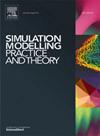CADCO: An Adaptive Dynamic Cloud-fog Computing Offloading Method for complex dependency tasks of IoT
IF 3.5
2区 计算机科学
Q2 COMPUTER SCIENCE, INTERDISCIPLINARY APPLICATIONS
引用次数: 0
Abstract
With the rapid development of the Internet of Things (IoT) and cloud-fog computing, efficient offloading of complex dependency tasks has become a key challenge for improving system performance, especially for real-time IoT applications. Traditional methods are inefficient in handling dynamic environments and long-range dependencies, while existing deep reinforcement learning approaches face issues such as rigid resource allocation and Q-value overestimation. To address these problems, we propose an Adaptive Dynamic Cloud-fog Computing Offloading Method for complex dependency tasks (CADCO). The method accurately models task dependencies using the multi-head attention mechanism of Transformer, optimizes computational and memory resource allocation through Hybrid Model Parallelism (HMP) technology, and designs a dynamic offloading strategy based on an improved Double Deep Q-Network (DDQN). A freshness factor is introduced to optimize the experience replay mechanism, enhancing the stability of the strategy. Experimental results show that CADCO demonstrates significant advantages in multi-user, multi-task offloading scenarios, optimizing task scheduling, improving resource utilization, and significantly enhancing QoS while reducing task latency and energy consumption. These results validate the practical application value of CADCO in complex task dependency environments, providing solid theoretical and experimental support for intelligent computing offloading optimization.
CADCO:物联网复杂依赖任务的自适应动态云雾计算卸载方法
随着物联网(IoT)和云雾计算的快速发展,复杂依赖任务的高效卸载已成为提高系统性能的关键挑战,特别是对于实时物联网应用。传统方法在处理动态环境和远程依赖关系方面效率低下,而现有的深度强化学习方法面临资源分配僵化和q值高估等问题。为了解决这些问题,我们提出了一种复杂依赖任务的自适应动态云雾计算卸载方法(CADCO)。该方法利用Transformer的多头注意机制精确建模任务依赖关系,通过混合模型并行(HMP)技术优化计算和内存资源分配,并设计了基于改进双深度Q-Network (DDQN)的动态卸载策略。引入新鲜度因子对体验回放机制进行优化,增强了策略的稳定性。实验结果表明,CADCO在多用户、多任务卸载场景下具有显著优势,可以优化任务调度,提高资源利用率,在降低任务延迟和能耗的同时显著增强QoS。这些结果验证了CADCO在复杂任务依赖环境中的实际应用价值,为智能计算卸载优化提供了坚实的理论和实验支持。
本文章由计算机程序翻译,如有差异,请以英文原文为准。
求助全文
约1分钟内获得全文
求助全文
来源期刊

Simulation Modelling Practice and Theory
工程技术-计算机:跨学科应用
CiteScore
9.80
自引率
4.80%
发文量
142
审稿时长
21 days
期刊介绍:
The journal Simulation Modelling Practice and Theory provides a forum for original, high-quality papers dealing with any aspect of systems simulation and modelling.
The journal aims at being a reference and a powerful tool to all those professionally active and/or interested in the methods and applications of simulation. Submitted papers will be peer reviewed and must significantly contribute to modelling and simulation in general or use modelling and simulation in application areas.
Paper submission is solicited on:
• theoretical aspects of modelling and simulation including formal modelling, model-checking, random number generators, sensitivity analysis, variance reduction techniques, experimental design, meta-modelling, methods and algorithms for validation and verification, selection and comparison procedures etc.;
• methodology and application of modelling and simulation in any area, including computer systems, networks, real-time and embedded systems, mobile and intelligent agents, manufacturing and transportation systems, management, engineering, biomedical engineering, economics, ecology and environment, education, transaction handling, etc.;
• simulation languages and environments including those, specific to distributed computing, grid computing, high performance computers or computer networks, etc.;
• distributed and real-time simulation, simulation interoperability;
• tools for high performance computing simulation, including dedicated architectures and parallel computing.
 求助内容:
求助内容: 应助结果提醒方式:
应助结果提醒方式:


